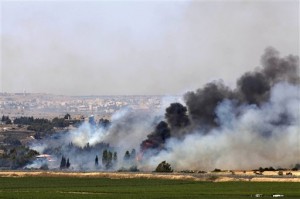UN seeks fresh Golan troops after Austria pullout

Smoke rises from a fire as a result of fighting in the Syrian village of Quneitra near the border with Israel, as seen from an observatory near the Quneitra crossing June 6. AP
UNITED NATIONS—The UN force in the Golan Heights was thrown into disarray Thursday after Austria withdrew its troops and two peacekeepers were injured as Syrian government and rebel fighters battled for a border crossing.
Peacekeepers from the Philippines and India were wounded by mortar shrapnel as the Syrians fought for the strategic crossing, according to diplomats.
UN leaders held emergency talks to replace the 377 Austrian troops who make up more than a third of the United Nations Disengagement Observer Force (UNDOF), which has monitored a ceasefire between Israel and Syria since 1974.
Austrian Foreign Minister Michael Spindelegger called UN chief Ban Ki-moon to tell him of the withdrawal, said UN spokesman Martin Nesirky.
“The secretary general is concerned about the potential consequences of such a withdrawal on the peacekeeping operation and also on regional security, and in that regard, he regrets the decision that has been taken,” Nesirky added.
Article continues after this advertisementAustria has been the cornerstone of UNDOF for many years. Nesirky said the UN was in talks with Vienna about the timing and other details of the withdrawal.
Article continues after this advertisementThe country’s defense minister, Gerald Klug, said the withdrawal would take between two and four weeks and could start as soon as Tuesday.
UNDOF has played a key role in monitoring the peace between Syria and Israel over the past four decades and there are growing fears that Israel could be drawn into the Syrian war.
The Austrian pullout would leave the force with just 341 troops from the Philippines and 193 from India, said Nesirky. A year ago, UNDOF had more than 1,100 troops, but Japan and Croatia have already pulled out in recent months.
Fiji has promised some replacement troops but they have not yet arrived.
The UN Security Council is to hold talks on the UNDOF crisis on Friday.
The council released a statement late Thursday which “strongly condemned” the fighting in the ceasefire zone and called on both sides to ensure the security of the peacekeepers, who only carry light arms.
Austria acted as tensions from the Syrian war reached a new peak in the Golan, with rebels briefly taking over the Quneitra crossing between Israel and Syria, which is normally controlled by UNDOF.
President Bashar al-Assad’s forces later moved in with tanks and recaptured the crossing, according to an AFP correspondent and Israeli sources.
There was “intense fighting,” said UN peacekeeping spokeswoman Josephine Guerrero.
Two peacekeepers “sustained minor injuries after mortar rounds impacted Camp Ziouani. Both peacekeepers are reported to be in stable condition,” Guerrero added.
The government of the Philippines said one of its troops was hit by shrapnel. Diplomats said the second casualty was from India.
Filipino troops have twice been abducted by rebel forces in the past four months and UNDOF’s patrols have been severely curtailed as fallout from the 26-month-old Syrian conflict grows.
The Philippines has regularly said it is reviewing the safety of its troops in the Golan force, but Nesirky said he was not aware of any move by Manila to withdraw its contingent.
The move by Austria is “significant” because it provides such a large amount of the UNDOF force, said Britain’s UN envoy Mark Lyall Grant, president of the UN Security Council for June.